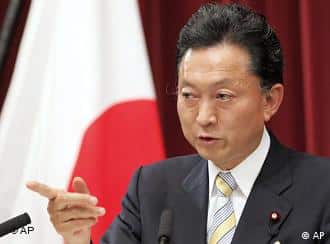Yukio Hatoyama, former Japanese Prime Minister attended a memorial service on Saturday where he apologized for the brutalities committed by Japan against Koreans during wartime. The memorial was held to remember those killed in a historic battle on the sea between the two countries in the 16th century.
Hatoyama was a center-left-leaning leader who held office from 2009 to 2010. He delivered the speech at the memorial held on a small Island 349 kilometers from the south of South Korea’s capital city Seoul. The island is called Jindo Island and the event was held on Mount Waedeok. The memorial commemorated Sailors from Japan who were killed in the Myeongyang battle in 1597.
In his speech, Hatoyama said that Japan had caused Koreans huge suffering. He says he is not sure whether the hearts of the people can be healed from his apology but according to him, the Japanese are obliged to keep apologizing until the ones with wounded hearts do not feel they require an apology.

The event was attended by almost 100 people belonging from both countries. The event was co-hosted by organizations from both countries, one of which was the Jindo Cultural Center and the other was the Peace Organization based in Kyoto.
During the Japanese invasion in 1592-1598, Korean Admiral Yi Sun-sin and his 12-ship fleet gained victory in the battle against the Japanese near the island. The remains of estimated 100 people were buried by the residents near the mountain on the sunny side. Waedeok, the mountain’s name means “extending virtue to the Japanese.”
Former Japanese Prime Minister Hatoyama’s statement
Former Japanese Prime Minister Hatoyama had said that the Japanese should not forget the warm treatment the Koreans have always given the Japanese and considered them as humans whether they were allies or foes. He says their future will get brighter if everyone from both countries acknowledges the historical events that took place on Mount Waedeok.
Just a few days prior, both Japan and South Korea had taken vows to restore their relations in “informal” talks. On Wednesday both the leaders from the countries addressed the deteriorating relations in the past three years to the worst conditions in over decades. The issues have risen from territorial disputes and wartime labor.

Although, the talks between both the countries’ Prime Minister, Fumio Kishida from Japan, and President Yoon Suk Yeol from South Korea had been disclosed to the media where the talks were described as informal so it is signaled that the relations remain delicate and probably there will be no drastic improvements soon.
The countries also share grave concerns over North Korea’s nuclearization and the troubles the North Korean weapons program might cause in the East Asian region.
According to the Japanese Foreign Ministry, both Japan and South Korea are important neighbors in the current environmental strategy. Both countries must promote the importance of bilateral cooperation or even trilateral cooperation with the United States of America.
A brief diplomatic history between the two countries
Japan and South Korea’s relations have spanned over 15 centuries, where their ties were characterized by cultural exchanges, trade and business, political communications, and military confrontations. All of these reasons still underlie both nations’ relations even today.
During the pre-world war II era, Japan had total control over both North and South Korea under the 1910 Korea Annexation Treaty. When the war ended, Soviet forces overtook control of the North from Japan and American forces did the same to the South.
Diplomatic relations between Japan and South Korea only started blooming in 1965. During the 2000s, relations again began to sour as the then Japanese Prime Minister Junichiro Koizumi’s visits to Yasukuni shrine were disliked by the South as well as the dispute over Liancourt Rocks(a group of small islets) territory further weakened the relations.
The debate over history and historical texts are also brewing conflict between Japan and South Korea(North Korea as well).

In 2015, South Korea and Japan started the debate over comfort women, or women who were used by the Japanese military men during World War II, the debate caused the relations to reach a high point. Former Japanese Prime Minister Shinzo Abe publicly apologized over this issue, and Foreign Minister pledged that Japan will pay over 1 billion yen in reparations.
The new apology by the current Japanese Prime Minister is going to further strengthen the ties between the two countries.













